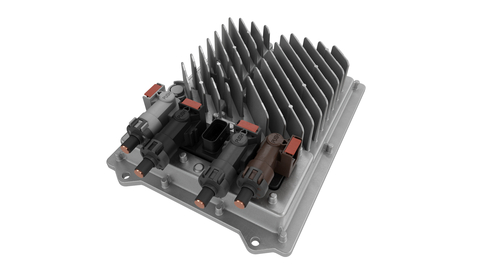Power management company Eaton today announced it has reached the first agreement to supply its new 48-volt programmable aftertreatment heater controller for electrically heated catalysts to a global commercial vehicle manufacturer. Rapidly warming up the diesel exhaust aftertreatment catalyst, and keeping it warm during low engine load operation, is essential for optimal performance to reduce harmful nitrogen oxide (NOx) exhaust emissions.
This press release features multimedia. View the full release here: https://www.businesswire.com/news/home/20231010289224/en/

Eaton’s eHeater controller warms up the diesel exhaust aftertreatment catalyst to reduce harmful nitrogen oxide (NOx) exhaust emissions. (Photo: Business Wire)
“Eaton was chosen to supply this system due to our legacy of developing low-voltage power conversion and power electronics solutions,” said Ben Karrer, head of engineering, Low Voltage and Power Conversion, Eaton’s Mobility Group. “We have been selling similar technologies for decades for global agricultural and military applications, among others. This marks a milestone for us as we are now introducing this innovative technology to the commercial vehicle sector.”
The air-cooled electric catalyst heater controller is part of Eaton’s broader 48-volt electrical system portfolio, which contains several technologies that allow manufacturers to integrate 48-volt architectures in next-generation vehicles. Eaton’s family of electric heater power electronics controllers are being developed for solutions between 2 kW and 15 kW of power and operate with up to 99% peak efficiency. The controller is designed to receive power commands from the aftertreatment system, provide soft-start and stop capabilities for assisting in maintaining system voltage control, and diagnostic feedback of the heater element.
“The aftertreatment catalyst heater controller contains all the necessary power electronics to efficiently deliver power to the heater to optimize engine performance and ensure the vehicle electrical system remains stable during heater operation,” Karrer said.
This technology comes at a time when vehicle manufacturers are facing tightening emissions standards around the globe. In the U.S., the California Air Resources Board and U.S. Environmental Protection Agency are introducing more stringent diesel regulations in 2024 and 2027. In Europe, the next stage of emissions standards is known as Euro VII for heavy-duty diesel trucks. Collectively, the new regulations are designed to reduce tailpipe NOx emissions by up to 90%, thus accelerating the need for global manufacturers to employ additional emission-reducing strategies such as electric catalyst heating.
Eaton is an intelligent power management company dedicated to improving the quality of life and protecting the environment for people everywhere. We are guided by our commitment to do business right, to operate sustainably and to help our customers manage power ─ today and well into the future. By capitalizing on the global growth trends of electrification and digitalization, we’re accelerating the planet’s transition to renewable energy, helping to solve the world’s most urgent power management challenges, and doing what’s best for our stakeholders and all of society.
Founded in 1911, Eaton is marking its 100th anniversary of being listed on the New York Stock Exchange. We reported revenues of $20.8 billion in 2022 and serve customers in more than 170 countries. For more information, visit www.eaton.com. Follow us on Twitter and LinkedIn.
View source version on businesswire.com: https://www.businesswire.com/news/home/20231010289224/en/
Contacts
Thomas Nellenbach
thomasjnellenbach@eaton.com
(216) 333-2876 (cell)




